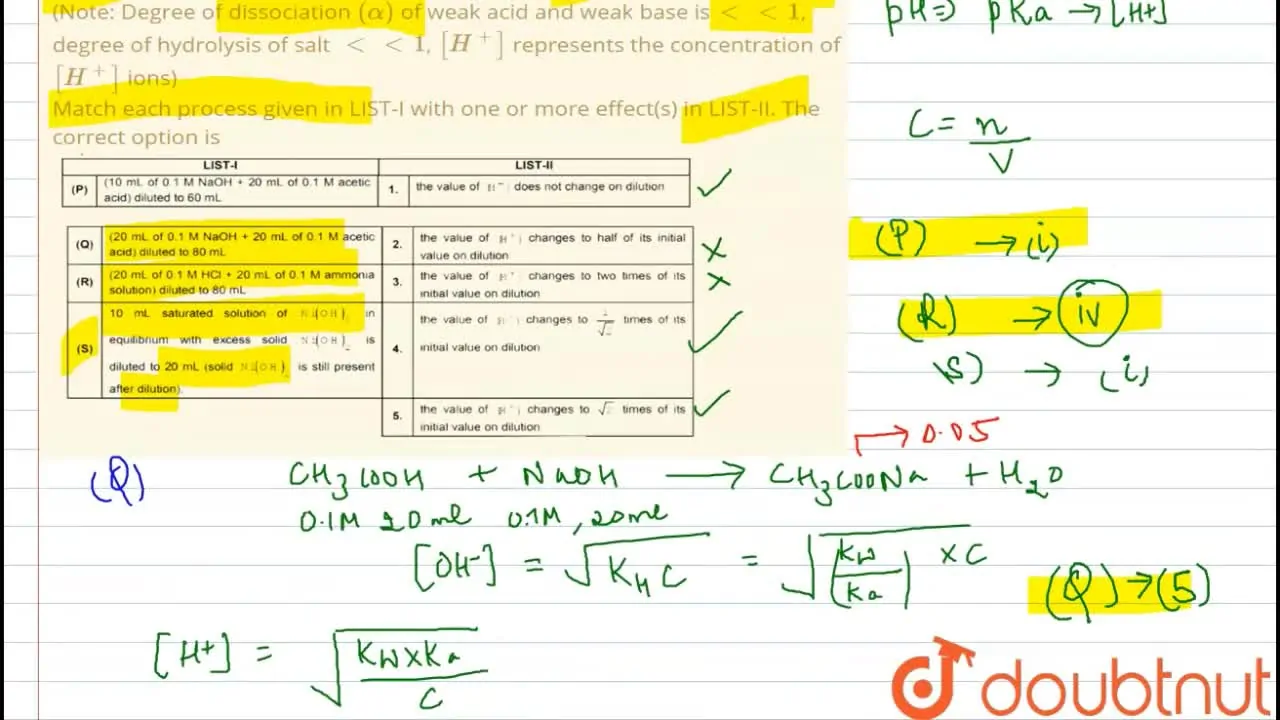Dilution processes of different aqueous solutions, with water, are given in LIST-I. The effects of dilution of the solutions on [H+]. are given in LIST-II.(Note: Degree of dissociation (α) of weak acid and weak base is<<1, degree of hydrolysis of salt <<1, [H+] represents the concentration of [H+] ions)
Match each process given in LIST-I with one or more effect(s) in LIST-II. The correct option is
![Dilution processes of different aqueous solutions, with water, are given in LIST-I. The effects of dilution of the solutions on [H^(+)]. are given in LIST-II.(Note: Degree of dissociation (alpha) of weak acid and weak base islt lt1, degree of hydrolysis of salt lt lt1, [H^(+)] represents the concentration of [H^(+)] ions) Match each process given in LIST-I with one or more effect(s) in LIST-II. The correct option is](https://d10lpgp6xz60nq.cloudfront.net/physics_images/VMC_CHE_WOR_BOK_02_C09_E05_065_Q01.png)
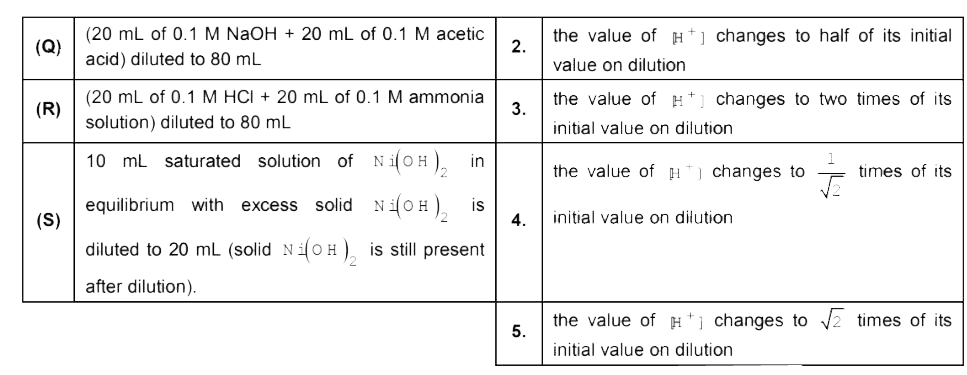
P→4,Q→2,R→3,S→1
P→4,Q→3,R→2,S→3
P→1,Q→4,R→5,S→3
P→1,Q→5,R→4,S→1
The correct Answer is:D
P⇒CH3COOH+NaOH→CH3COONa+H2O
No effect of dilution on H^(+)
Q⇒CH3COOH+NaOH→CH3COONa+H2O(salt of W/A and S/A)
[H+]=√Kw×KaC,[H+]old=√Kw×KaC,[H+]new=
⎷Kw×KaC2=[H+]old×√2
R⇒NH3+HCl→NH4Cl(salt of W/B and S/A)
[H+]=√Kw×CKb,[H+]old=√Kw×CKb,[H+]new=√Kw×CKb×2=[H+]old×1√2
S⇒Ni(OH)2(s)→Ni2+(aq)+2OH−(aq)
No effect of dilution on [H+] as solution remain saturated.
Related Playlists
- BOOK - VMC MODULES ENGLISHCHAPTER - IONIC EQUILIBRIUMEXERCISE - Illustration - 11videos
IONIC EQUILIBRIUM
- BOOK - VMC MODULES ENGLISHCHAPTER - IONIC EQUILIBRIUMEXERCISE - Illustration - 21videos
IONIC EQUILIBRIUM
- BOOK - VMC MODULES ENGLISHCHAPTER - IONIC EQUILIBRIUMEXERCISE - JEE MAIN ( ARCHIVE )50videos
IONIC EQUILIBRIUM
- BOOK - VMC MODULES ENGLISHCHAPTER - INTRODUCTION TO ORGANIC CHEMISTRY EXERCISE - JEE ADVANCED ARCHIVE81videos
INTRODUCTION TO ORGANIC CHEMISTRY
- BOOK - VMC MODULES ENGLISHCHAPTER - JEE MAIN - 5EXERCISE - PART II : CHEMISTRY (SECTION - 2)5videos
JEE MAIN - 5
Similar Questions
A block of mass m1 = 1 kg another mass m2 = 2 kg, are placed together (see figure) on an inclined plane with angle of inclination θ. Various values of θ are given in List I. The coefficient of friction between the block m1 and the plane is always zero. The coefficient of static and dynamic friction between the block m2 and the plane are equal to μ=0.3 . In List II expressions for the friction on block m2 are given. Match the correct expression of the friction in List II with the angles given in List I, and choose the correct option. The acceleration due to gravity is denoted by g
[Useful information :tan(5.5∘)≈0.1,tan(11.5∘)≈0.2,tan(16.5∘)≈0.3].
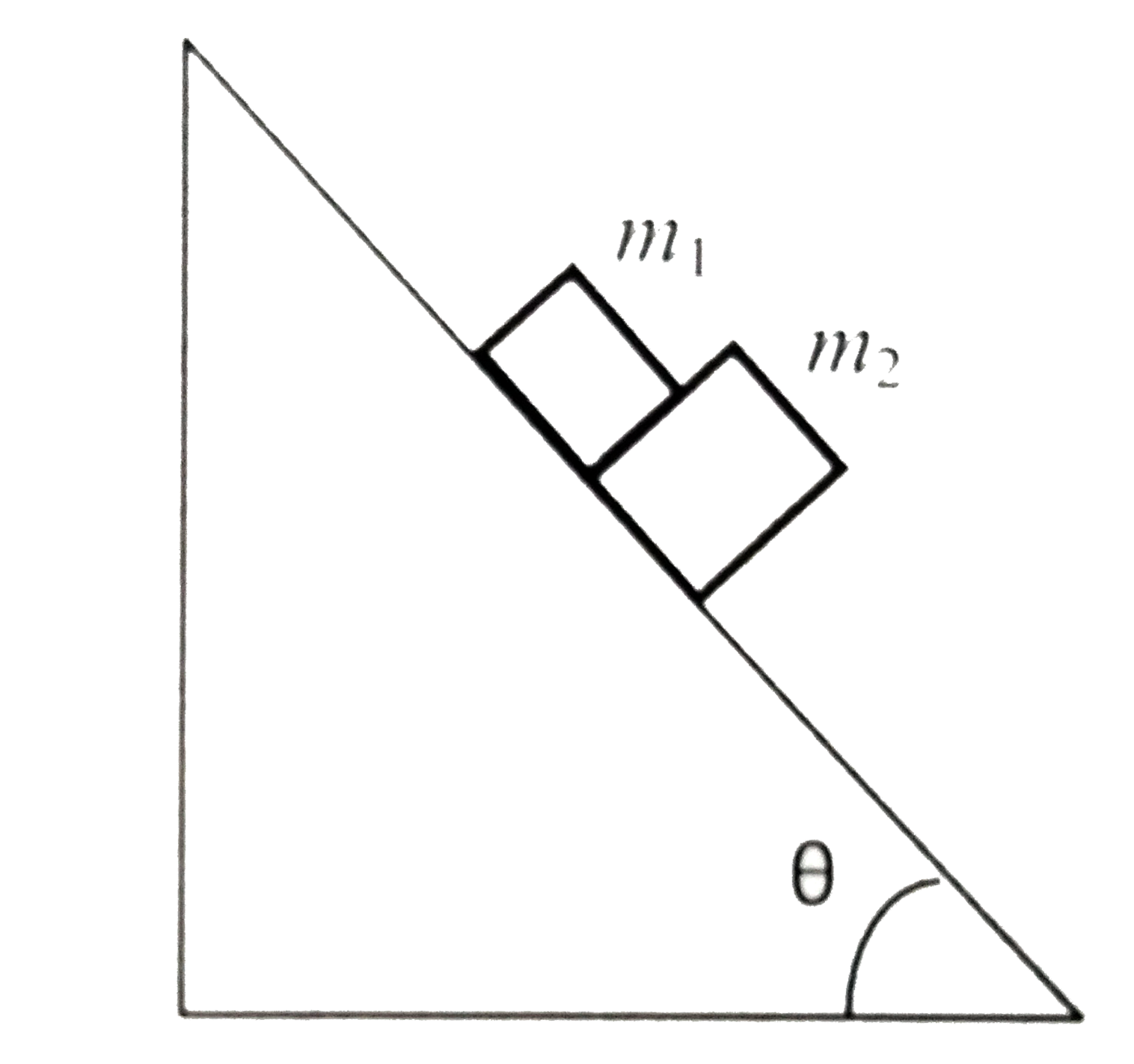
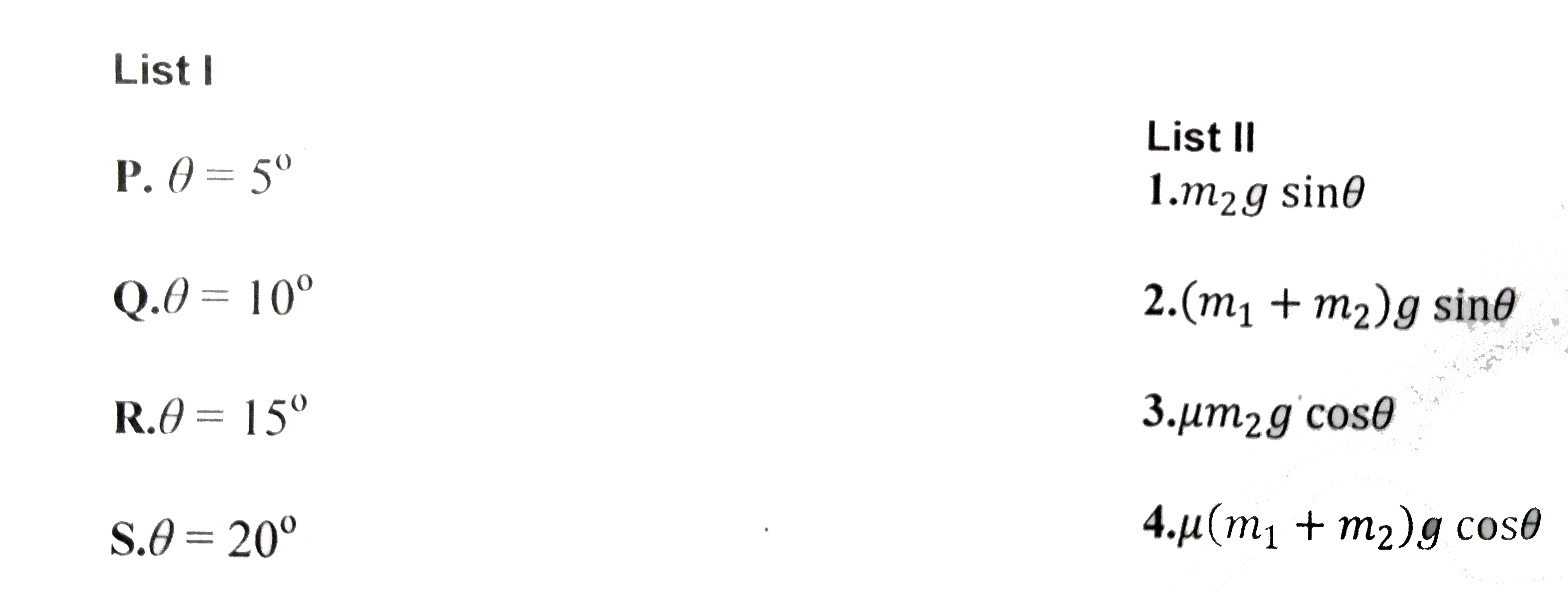 View Solution
View SolutionA block of mass m1=1kg and another mass m2=2kg are placed together(see figure) on an inclined plane with angle of inclination θ varius value of θ are given in list 1 The coefficient of friction between the block m1 and the plank is always zero The coefficient of static and dynamic friction between the block m2 and the plank are equal to μ=0.3 In List II experssions for the friction the block m2 are given Match the correct experssions of the frictionless in List II with the angle given in list 1 and choice the correct option The acceleration due too gravity detented by g
[Useful information tan(5.5∘)=0.1tan(11.5∘)=0.2tan(16.5∘)=0.3]
List I P. θ=5∘ Q. θ=10∘
R. θ=15∘ S. θ=20∘
List 2
1.m2gsinθ 2.(m1+m2)gsinθ
3.μm2gcosθ 4. μ(m1+m2)gcosθView Solution1.0 M solution of a weak base , BOH is only 0.5 % ionized . If 2 mL 1 M solution of BOH is mixed with 30 mL water , the degree of dissociation of the base in the resulting solution and H+ ion concentration of the solution will bee respectively
View SolutionCalculate t the H+ ion concentration in 0.10 M acetic acid solution. Given that the dissociation constant of acetic acid in water is 1.8×10−5
View SolutionCalculate the H+ ion concentration in 0.10 M acetic acid solution- Given that the dissociation constant of acetic acid in water is 1.8×10−6.
View SolutionAn aqueous solution containing 12.48g of barium chloride in 1.0 kg of water boils at 373.0832 K. Calculate the degree of dissociation of barium chloride. [Given Kb for H2O=0.52Km−1, Molar mass of BaCl2=208.34g mol−1]
View SolutionMatch list - I (hormones) with list - II (effect) and select the correct answer using the codes given below the lists
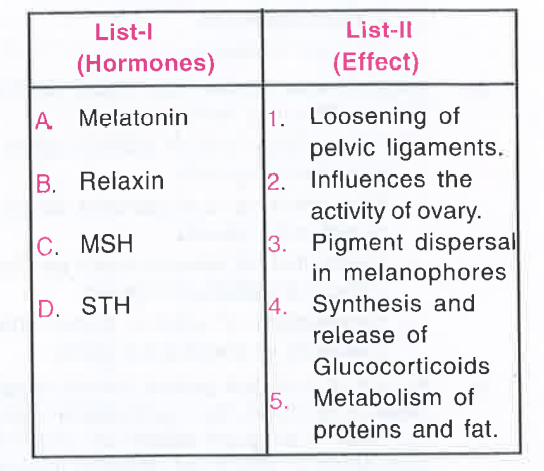 View Solution
View SolutionWhen a salt reacts with water to form acidic or basic solution , the process is called hydrolysis . The pH of salt solution can be calculated using the following relations :
pH=12[pKw+pKa+logc] (for salt of weak acid and strong base .)
pH=12[pKw−pKb−logc] (for salt of weak base and strong acid ) .
pH=12[pKw+pKa−pKb] (for weak acid and weak base ).
where 'c' represents the concentration of salt .
When a weak acid or a weak base not completely neutralized by strong base or strong acid
respectively , then formation of buffer takes place . The pH of buffer solution can be calculated using the following relation :
pH=pKa+log.[Salt][Acid],pOH=pKb+log.[Salt][Base]
Answer the following questions using the following data :
pKa=4.7447,pKb=4.7447,pKw=14
0.001 M NH4Cl aqueous solution has pH :View SolutionWhen a salt reacts with water to form acidic or basic solution , the process is called hydrolysis . The pH of salt solution can be calculated using the following relations :
pH=12[pKw+pKa+logc] (for salt of weak acid and strong base .)
pH=12[pKw−pKb−logc] (for salt of weak base and strong acid ) .
pH=12[pKw+pKa−pKb] (for weak acid and weak base ).
where 'c' represents the concentration of salt .
When a weak acid or a weak base not completely neutralized by strong base or strong acid
respectively , then formation of buffer takes place . The pH of buffer solution can be calculated using the following relation :
pH=pKa+log.[Salt][Acid],pOH=pKb+log.[Salt][Base]
Answer the following questions using the following data :
pKa=4.7447,pKb=4.7447,pKw=14
When 100 mL of 0.1 M NH4OH is added to 50 mL of 0.1M HCl solution , the pH isView SolutionWhen a salt reacts with water to form acidic or basic solution , the process is called hydrolysis . The pH of salt solution can be calculated using the following relations :
pH=12[pKw+pKa+logc] (for salt of weak acid and strong base .)
pH=12[pKw−pKb−logc] (for salt of weak base and strong acid ) .
pH=12[pKw+pKa−pKb] (for weak acid and weak base ).
where 'c' represents the concentration of salt .
When a weak acid or a weak base not completely neutralized by strong base or strong acid respectively , then formation of buffer takes place . The pH of buffer solution can be calculated using the following relation :
pH=pKa+log.[Salt][Acid],pOH=pKb+log.[Salt][Base]
Answer the following questions using the following data :
pKa=4.7447,pKb=4.7447,pKw=14
50 mL 0.1 M NaOH is added to 50 mL of 0.1 M CH3COOH solution , the pH will beView Solution

